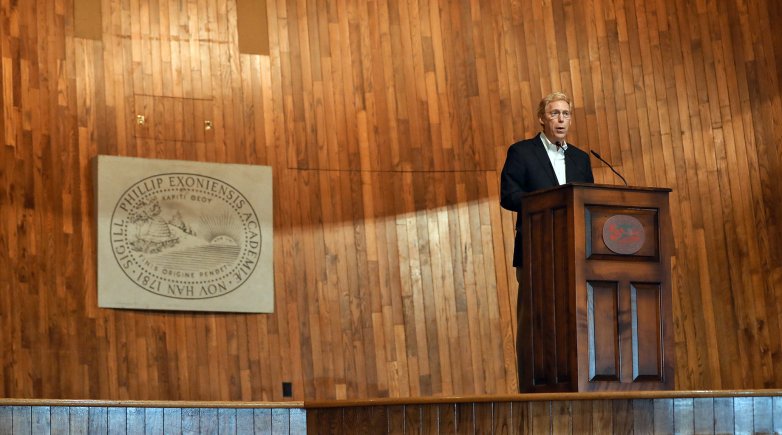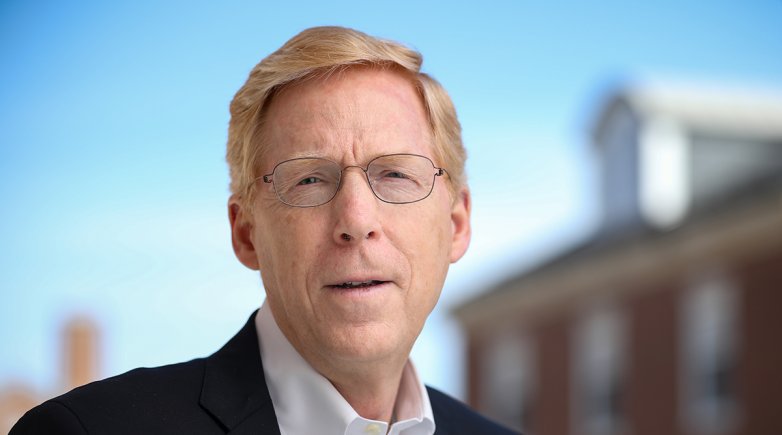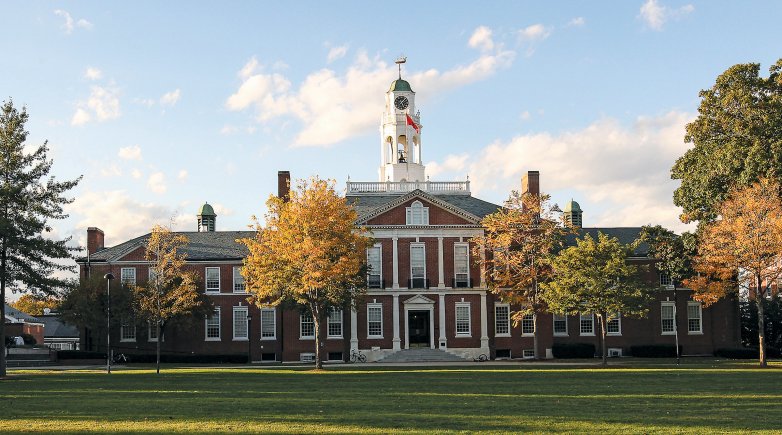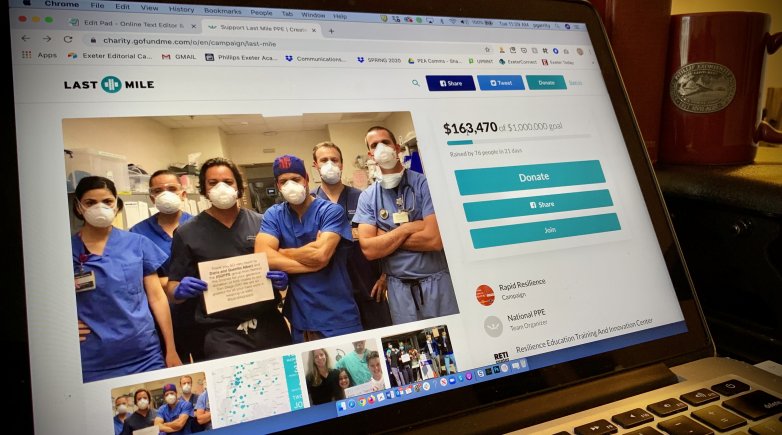Principal Rawson's virtual assembly remarks
“Exeter lives within each of us and forms around us, no matter the distance between us," said Principal Bill Rawson in a historic virtual assembly.
Hello, Exeter.
Hello to our students, to faculty and staff, to parents and alumni who are watching, and to all friends of Exeter who are watching. Welcome to the first entirely virtual assembly in the history of our school.
I would like to start by saying to our students how much I miss being able to look out and see all of your faces from this stage. The deliberate act of joining together as a community every week is fundamental to our Exeter experience. I always look forward to being in the same room with you and having that shared time together. It feels very strange to deliver these remarks without you here in the Assembly Hall.
Technology provides us with the ability to remain connected during this global pandemic, but I am eager for us to be together again on campus, when it is safe to do so. I will say more about that later in my remarks. But since this all began, our understanding of the word “community” has evolved to encompass this shifting reality, and reaffirms for all of us that “Exeter” is not bounded by its geography. “Exeter” lives within each of us and forms around us, no matter the distance between us.
When this pandemic first erupted, it was common to refer to it as unprecedented. But as many of you know, it is not unprecedented. The 1918 global influenza pandemic caused an estimated fifty million deaths worldwide; more than 675,000 in the United States alone. Neither the Town of Exeter nor the Academy was spared. You can read about it in the digital archives of The Exonian.
On October 2, 1918, The Exonian reported:
"A week ago today the grip epidemic struck the Academy with full force. Since then many things have happened. One boy has succumbed to the disease, two others have been threatened with the same fate, over 75 other students have been taken ill. … Church and chapel services and all other such meetings have been entirely suspended for the present. The old gymnasium has been turned into a hospital for students. Over 25 beds are occupied by patients at present."
Public schools were closed, as was the Ioka Theater, and many public gatherings were postponed, but the Academy could not send its students home for fear of contributing to the virus’s spread. The Exonian accordingly advised its readers to:
"Avoid all unnecessary crowds, such as in theatres, movies, crowded street and railroad cars, also all private and semi-public gatherings. Keep out of doors, walk to work if possible and sleep with the windows open. Make use of all available sunshine."
The peak of the outbreak apparently passed through the Academy fairly rapidly, as the next issue of The Exonian, on October 9, reported further:
"The past week has seen a great decline in the number of cases of grip in the Academy. At present there are only ten cases, all of which are being cared for in the Infirmary. … Since the last issue of the Exonian, over fifty patients have been discharged. The omission of chapel services, weekdays and on Sunday, the closing of the study hall, the postponement of all society meetings, the closing of the Ioka Theatre and soda fountains have doubtless been great factors in stamping out the epidemic, while the precaution of each individual student has in a large measure been responsible for the change to the better."
That was 1918. Pre-Harkness. Before TV was invented. No 3-D image of the virus. The field of medicine was very different. The country was at war and the popular press often downplayed the public health threat until it was too obvious to be ignored — both factors contributed to the staggering death toll. Two Exeter students, and possibly a third, fell victim to the pandemic.
Given what we know about the COVID-19 virus, and what we still do not know, our decision to close our campus this spring and hold classes remotely was the best and safest course of action to protect our school community, our families and friends, and our neighbors in the surrounding towns. That does not change how much we miss having all of you here. I walk through campus and I feel your absence daily. But I am hopeful that you and your families are staying safe, are healthy, and are coping with this period of time as best as you can.
I would like to recognize the challenges all students have faced adapting to a distance learning experience. Our Harkness pedagogy is built around being physically together and learning from each other. That is hard to do when you are spread around the globe, many classes are being conducted asynchronously, and you face competing and varying responsibilities at home. It is hard to do when you miss your friends and cannot enjoy the ready assurance and support that comes from daily contact with teachers, coaches, advisers and counselors. It also is hard to do when you are working many hours a week to earn money. I commend all of you for rising to the occasion as you have. We will do our best to support you and help you finish the term as strongly as circumstances permit.
I also would like to express how grateful we are for the active role your families have played in supporting your education during this difficult time. Without their support, and without their belief in you and their willingness to make sacrifices on your behalf, we could not build our virtual school community and get through this together. I hope you will thank them for me.
I will say, Exonians, the speed and energy with which many of you set out to create a virtual community was nothing short of astonishing. The Exonian started publishing online while we were still on spring break. YouTube videos challenging us to stay connected started appearing, as if by magic. As digital natives, you are skilled at creating online communities — this is second nature to you — but we nonetheless are grateful for your leadership, insights and innovation in that realm. From quarantine cooking, arts and musical pop-up Instagram accounts, to student podcasts and YouTube performances, you are working hard not only to create a sense of togetherness but also to build upon the bonds that already exist at Exeter.
In the past few weeks, a weekly e-newsletter for preps has also launched; athletic teams have been holding virtual team workouts (I particularly enjoyed the girls lacrosse stickhandling video — very impressive); and dorms are holding “common room” Zooms. Fight Club is holding weekly meetings. DRAMAT is holding online performances — even I have been cast to perform in a play called Bad Auditions. Seniors, thank you for your inspiring meditations. All these points of connection are vital — and revitalizing — and I thank all of you for your efforts to keep our Exeter community engaged and strong.
We held back on student clubs for a couple of weeks to get the academic program up and running, but the alacrity with which clubs mobilized various non sibi efforts is another source of inspiration for us all. Student climate leaders developed a virtual Climate Action Day through a website dedicated to activism, education and dialogue as we marked the 50th anniversary of Earth Day. Relay for Life student organizers moved online to remember and honor loved ones who have battled cancer; thank you for inviting me to participate, and congratulations on raising thousands of dollars. ESSO has launched a new website and educational videos. I am barely scratching the surface. Thank you to everyone who has participated in these and other non sibi initiatives and in the many other club activities underway.
If we were all gathered together in this Assembly Hall right now, I would ask you to take a moment to recognize our faculty with resounding applause, as you do at Opening Assembly. Consider for a moment what they have undertaken this term, as they have simultaneously negotiated the needs of their families at home and almost overnight restructured our Harkness pedagogy into a remote learning experience. They did so with the express goal of providing an equitable, inclusive learning experience for every student, and with a desire to maintain as much academic content as circumstances would permit. And they too have found countless ways to create virtual community and stay connected with all of you. They are working tirelessly on your behalf, and miss you as much as you miss being here.
Dozens of other adults on campus also continue to keep our school running in critical ways, and they too have worked tirelessly to support our transition to distance learning. It is harder for you to see their efforts, but they, like your instructors, put the student experience at the fore of everything they do. You are supported by a dedicated group of professionals whose commitment to Exeter and our surrounding community reflects not only our non sibi values, but also the Academy’s founding principles of goodness and knowledge united.
We are all impacted by this pandemic, and we feel the urgency to act if we are able. Many of you have had the opportunity to join in the fight against the pandemic’s spread, and to support people in greatest need. You have used a social fundraising platform to feed first-responders. You have developed a website that tracks COVID-19 testing sites. You have donated face masks and other PPE to local hospitals, and even shipped some face masks for donation in the Town of Exeter. You are making a difference. You are changing lives. I know it has been hard at times, but you are being your best selves during a difficult time. As we continue to work to flatten the curve, please remember to take care of yourselves, as you take care of others.
What about the next school year? The short answer is that we do not yet know. We are in the same position as every other similar school, and most colleges and universities, in that our ability to be on campus will depend in part on external factors that are yet to be determined: the state of the pandemic generally and locally, the availability of testing, and the status of state executive orders.
Our decision-making will be driven by the same two priorities that have guided us thus far: the safety and well-being of our school community, and not contributing to the spread of COVID-19.
Our hope is that we will open on campus on time in September. We are hard at work on that right now. We anticipate making a decision in June, possibly late June, when we expect to have more information and direction from state and federal agencies to act upon.
When we do return to campus, as long as the health threat persists to some degree, we will need to adjust our habits so that we can be together safely. We are evaluating daily schedules and examining every aspect of our daily routines to map out a strategy that will include social distancing guidelines, cleaning and disinfecting protocols, the health monitoring of our students and employees, and a rapid response plan to identify, test, treat and isolate any potential cases. We are committed to keeping you safe and to ensuring our community remains vibrant and strong.
We also are engaging in contingency planning for the possibility that we will need to start the school year online, or resume distance learning at some point during the academic year. With much more time to prepare, and the benefit of this spring term serving as our “pilot,” we anticipate that any distance learning 2.0 will be very different and considerably richer. With the opportunity to group students by time zones, at least in those courses that have many sections, we would hope to be able to provide more opportunities for synchronous learning. We also are learning a great deal this spring, as already described, about how to maintain community while apart and support student activities outside the classroom — those experiences also should be very different. Importantly, our commitment to providing an equitable and inclusive learning experience for all students will continue to guide us in all that we do.
Whether we are on campus for the entire year, or off campus for part of the year, the mission of our school will remain the same. Our mission is to unite goodness and knowledge and inspire youth from every quarter to live purposeful lives. Our values as a school do not change with venue. Students, you have amply demonstrated this spring that our commitment to non sibi goes wherever you go.
My relationship with Phillips Exeter Academy spans many years. There has never been a time when I did not think Exeter was getting better. The school remains true to its mission and values by constantly evolving. Sure, older alums such as myself sometimes like to idealize the past, but then we need only to remember the words of the legendary Hammy Bissell ’29, who once famously said, “Exeter isn’t what it used to be, and thank God it never was.”
As Exeter continues to evolve, how students experience the Academy also changes with the times. In my first opening assembly address, last academic year, I spoke to you about what it was like to be a student at Exeter in 1968 — a very tumultuous year in the history of the United States. Now you are experiencing Exeter through the lens of a global pandemic the likes of which our world has not seen in more than 100 years. The pandemic has laid bare inequities within our society and demonstrated cruel outcomes for many people, especially those who are more vulnerable, lack economic stability, or lack ready access to affordable health care. The spread and subsequent impact of the COVID-19 virus have served as stringent reminders of just how connected we all are in the world, and how dependent we are upon each other. We see how the actions of some people can lead to the suffering of others, and how the kindnesses of some can ease the burdens and lift the spirits of others.
We experience this sense of connectedness acutely ourselves, as we shelter at home and wear masks to protect those around us. Others work on the front lines caring for the sick and dying or perform essential services for our benefit at considerable personal risk.
The world has shifted, and you must ask yourselves, how will you respond? When we return to “normal,” it will be a new and different normal, and your understanding of the world will have changed. How will these events shape your time at Exeter, the choices you make and the paths you choose to pursue? How will the events of today influence how you live a life of purpose tomorrow?
There are no easy or immediate answers to these questions. They will require reflection, time, and a deeper awareness of how our present reality might influence your future actions. Our pedagogy and school community are designed to help you ponder these questions, individually and together. Your conversations with your classmates are likely to continue for decades to come, and you will find answers that will change the world in which you live.
I would like to close by reading an excerpt from a poem that I hope you will find inspirational, as I have found it to be for me.
The poem was written in 1838, 182 years ago, by Henry Wadsworth Longfellow, and is called Psalm of Life. The language is a bit dated, but the poem retains its power and relevance nonetheless. You might think of the poem as Longfellow’s challenge to the reader to live a purposeful life. Here are the last three stanzas:
Lives of great men all remind us
We can make our lives sublime,
And, departing, leave behind us
Footprints on the sands of time;
Footprints, that perhaps another,
Sailing o’er life’s solemn main,
A forlorn and shipwrecked brother,
Seeing, shall take heart again.
Let us, then, be up and doing,
With a heart for any fate;
Still achieving, still pursuing,
Learn to labor and to wait.
In time, we will emerge from the current pandemic. Let us do so with renewed commitment to the mission of our school, with an even stronger feeling of community and commitment to each other, and with even greater determination to lead lives of purpose and meaning.
Let us all, in the words of Longfellow, “be up and doing, with a heart for any fate.” Let us all “learn to labor and to wait.”
Senior class.
— William K. Rawson ’71; P’08




